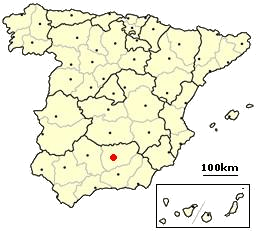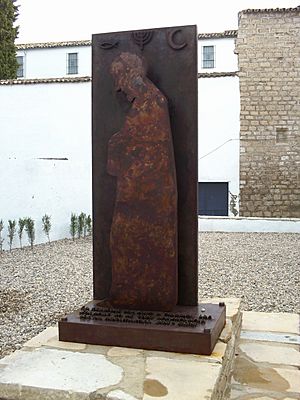Hasdai ibn Shaprut facts for kids
Hasdai ibn Shaprut was a very smart and important Jewish man who lived in Spain a long time ago, from about 915 to 970 AD. He was born in Jaén, Spain, and later lived in Córdoba, Andalusia. Hasdai was many things: a scholar (someone who studies a lot), a doctor, a diplomat (someone who works with other countries), and a patron of science (meaning he supported smart people and new discoveries).
His father, Isaac ben Ezra, was a rich and educated Jewish man. Hasdai learned a lot when he was young. He knew Hebrew, Arabic, and Latin very well. Latin was a special language back then, mostly known by church leaders. Hasdai also studied medicine. People even said he found a special medicine called Al-Faruk that could cure many things!
He became the doctor for Caliph Abd-ar-Rahman III, who was a very powerful ruler. Hasdai was so good at his job and so trustworthy that he became the Caliph's close friend and advisor. Even though he wasn't officially called a "vizier" (a top minister), he acted like the minister of foreign affairs, dealing with other countries. He also managed taxes on goods coming into the port of Córdoba. Hasdai helped the Caliph make friends with other powerful leaders.
In 949, an important group came from the Byzantine Empire (a big empire in the east) to make a deal with Spain. They brought a special book about plants by Pedanius Dioscorides. This book was very important for doctors and scientists. Hasdai, with help from a Greek monk named Nicholas, translated it into Arabic. This made the knowledge available to many more people in Spain and Europe.
Hasdai: A Smart Diplomat
Hasdai was very good at solving problems between countries. He helped the Caliph a lot, especially when an important person named John of Gorze came from Otto I (the German Emperor) in 956. The Caliph was worried the German Emperor's letter might say something bad about Islam. So, he asked Hasdai to talk to the visitors first.
Hasdai quickly realized the letter couldn't be given to the Caliph as it was. He was so clever that he convinced the visitors to send for a new letter that wouldn't cause any trouble. John of Gorze was very impressed, saying he had "never seen a man of such subtle intellect as the Jew Hasdeu."
Hasdai also had a big success when there were problems between the kingdoms of León and Navarre. Queen Toda of Pamplona from Navarre needed help from the Caliph to get her grandson, Sancho I of León, back on his throne. Hasdai went to Navarre and, after a long time, convinced the proud Queen to travel to Córdoba. She had to meet the Caliph, who was her old enemy, and ask for his help. This happened in 958. A Jewish poet at the time wrote that Hasdai convinced the Queen with his "charm of his words, the strength of his wisdom, the force of his cunning, and his thousand tricks."
Hasdai kept his important job even after Caliph Abd ar-Rahman III died. His son, al-Hakam II, became the new ruler and loved science even more than his father.
Helping the Jewish Community
Hasdai cared a lot about his fellow Jewish people and Jewish learning. He heard a rumor that there was a Jewish kingdom with a Jewish ruler far away in Central Asia. He wanted to write to this king! When two Jewish travelers confirmed the story of the Khazar kingdom, Hasdai gave them a letter written in good Hebrew. In the letter, he talked about his own important job in Spain, described where Spain was, and asked for details about the Khazars, like where they came from and how their government worked. (You can read more about this in the Khazar Correspondence.)
Hasdai also wrote a letter to Empress Helena Lekapene in the Byzantine Empire. He asked her to allow Jewish people in her empire to practice their religion freely. He pointed out that he had good relationships with the Muslim Caliph in Spain, and that the Caliph was kind to Christians there.
Hasdai sent many gifts to important Jewish schools called yeshivas in Babylonia, like the ones in Sura and Pumbedita. He also wrote letters to Dosa, the son of a famous Jewish scholar named Saadia Gaon. Hasdai played a key role in moving the center of Jewish studies from Babylonia to Spain. He appointed Moses ben Hanoch, a scholar who ended up in Córdoba, to lead a school there. This helped Jewish learning in Spain become independent from the East, which made the Caliph very happy. A historian named Abraham ibn Daud said that Hasdai "opened to his coreligionists in Andalusia the gates of knowledge of the religious law, of chronology, etc." Before Hasdai, Jewish people in Spain had to ask Jews in Baghdad for answers to legal questions or about the calendar.
Hasdai's work marked the beginning of a golden age for Jewish culture in Spain. Poetry and the study of Hebrew grammar became very popular among Spanish Jews. Hasdai himself was a scholar, and he encouraged others by buying Hebrew books from the East and supporting Jewish scholars. He gathered many smart people around him, including Menahem ben Saruq and Dunash ben Labrat, who both wrote poems for him.
See also
 In Spanish: Hasday ibn Shaprut para niños
In Spanish: Hasday ibn Shaprut para niños
 | DeHart Hubbard |
 | Wilma Rudolph |
 | Jesse Owens |
 | Jackie Joyner-Kersee |
 | Major Taylor |



